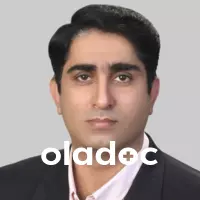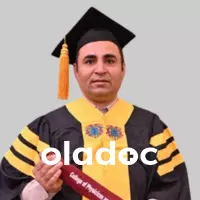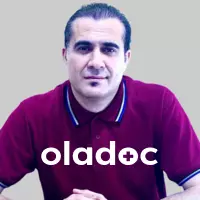47 Best Neurosurgeons in Peshawar
Dr. Akram Ullah
PMDC VerifiedNeurosurgeon
M.B.B.S., F.C.P.S. (Neurosurgery), ASCD (UAE), ESBD (FRANCE), CHR (RMI), CHPE (KMU)
Dr. Akram Ullah
PMDC VerifiedNeurosurgeon
M.B.B.S., F.C.P.S. (Neurosurgery), ASCD (UAE), ESBD (FRANCE), CHR (RMI), CHPE (KMU)
Who is a Neurosurgeon?
Neurosurgeons (دماغ کا سپیشلسٹ سرجن) are specialists who offer conservative and surgical treatment options for the ailments of the nervous system. They cater to people of all genders and age groups.
What is Neurosurgery?
Neurosurgery is the field of science that is concerned with the central and peripheral nervous system. Experts of neurosurgery therefore address the issues that are concerned with the peripheral nerves, brain and spinal cord.
When should you see a Neurosurgeon?
Laypeople are unaware of the complicated medical realm, and thus, they tend to visit their GP rather than a specialist doctor when accosted with episodes of pain or discomfort. A referral to the neurosurgeon (brain doctor) generally comes from a GP then.
Patients with diagnosed cases of neurological problems also need to be contact with their doctor. Since neuro surgeon (نیوروسرجن) also aid in conservative treatment, a visit to the brain specialist is not just for surgical procedure.
Moreover, one should visit the best neurosurgeon in Peshawar when accosted with injuries to the spine or the skull. Neurogenerative conditions like Parkinson’s disease are also addressed by neurosurgeons.
It is also pertinent to visit the doctor when one has chronic pain associated with the nervous system. People should also schedule an appointment with brain specialists when they have backache, epilepsy, etc.
A visit to the neurosurgeon (نیوروسرجن) is also due when people are experiencing numbness, alongside pain, in their limbs as it is a sign of nerve damage.
Similarly, since our nervous system plays an important role in muscle movement, inability to grasp things properly or having problems with gait and balance are also concerning signs. Tremors, involuntary shivers, uncontrollable body movements are also a sign of neurological problems that require expert intervention.
People afflicted with carpal tunnel syndrome, a condition that causes pain in the wrists and hands, also need to visit a neurosurgeon, as the condition occurs due to median nerve compression.
While occasional headaches due to lifestyle factors are not a cause for concern, but chronic headaches should not be made lightly of, especially if they are accompanied by sensitivity to light and noise, alongside nausea. These symptoms are also common in patients suffering from chronic migraines. Such people also need to visit a brain specialist.
Those suffering from seizures also need to see a neurologist. Seizures are common in people having epilepsy, but they also may be a sign of brain tumors or damage. Some seizures can be more apparent due to aggressive body movements, but more subtle types of seizures like staring, becoming disoriented, wandering are possible. Thus, people with less violent seizures should also visit a neurologist.
What are the most common neurological diseases in Pakistan?
Neurological problems are amongst the leading causes of death in developing countries like Pakistan. Scarcity of resources, both in terms of infrastructure and qualified doctors, further complicates the situation.
Common neurological disorders that afflict the global population include stroke, Parkinson’s disease, dementia, meningitis, encephalitis, tetanus, MS, etc.
The distribution in Pakistan, according to research conducted in Sindh, is slightly different. Headaches are the most reported neurological problems, whereas CNS infections are at the bottom rung. Detailed disease distribution is as follows:
| Disease | Percentage of Patients Infected |
|---|---|
| Headache disorders | 33.4% |
| Nerve and root lesion | 27.1% |
| Vascular diseases | 13.3% |
| Epilepsies | 5.2% |
| Muscle disorders | 3.9% |
| CNS infection | 2.8% |
What are the main areas of concern for a Neurosurgeon?
Neurosurgeons (دماغ کا سپیشلسٹ سرجن) address issues associated with the nervous system. Their areas of concern include anything that impairs the optimal functioning of the brain, spine, and nerves, whether it be blood supply or cellular damage.
One of the common conditions addressed by brain surgeons (دماغ کا سرجن) is carotid artery disease, in which the blood supply to head and neck is compromised. Not only is the lack of blood supply an issue itself, but it also increases the chances of stroke.
Head injuries are also the domain of a neurosurgeon. These range from concussions to brain trauma. Likewise, they also address chronic pain in the nervous system. Tumors of the brain and pituitary gland are also a brain surgeon’s area of expertise.
A neurosurgeon also is concerned with the diagnosis and treatment of hydrocephalus. More common in children, this condition occurs due to the buildup of cerebrospinal fluid in the brain.
Stroke is a consequence of impaired blood supply to the brain, which leads to the death of brain cells. As these cells do not rejuvenate, the implications for the health of the person are great. The extent of damage done is contingent on the area of the brain affected, and the severity of stroke.
Neurosurgeons offer treatment for stroke patients, which is a composite of surgical and conservative interventions. Most stroke patients also need to undergo extensive rehabilitation, facilitated by specialist doctors.
Spinal surgeons also are concerned with the treatment of cervical spine disorders, that cause the patient pain and weakness in the upper limbs and neck. Doctors also address any fractures to the spine.
Another area of concern for neurologists is a herniated disc(s), which causes intense back pain in the patient. Herniated discs may be treated using medication for pain relief, but some patients might also need to be operated upon.
Backache is also a common consequence of sciatica, a condition marked by the compressed or irritated sciatic nerve. Since the sciatic nerve runs along the legs as well, its compression leads to intense discomfort and mobility issues in patients.
Likewise, neurologists also deal with tumors of the spine and the brain. They also are responsible for catering to patients suffering from trigeminal neuralgia which causes constant or sporadic pain in the face and the jaw.
Neurosurgeons also are involved in addressing infections of the nervous system, meningitis being the most common problem. This infection occurs in the spine and outer part of the brain.
Parkinson’s disease is remarked by uncontrollable tremors in the body, balance and movement issues. Neurosurgeons are involved in managing the disease using a medication, and if need be, performing surgery to insert electrodes that improve the condition of the patient.
What kinds of Neurosurgeons are there?
Neurosurgery is further divided into subcategories. These include:
- Neuro-Oncology: This category is dedicated to the diagnosis and treatment of malignant and cancerous tumors of the brain, skull, spine or any other region of the nervous system.
- Neurotraumatology: Brain and spinal injuries are a sensitive matter. Experts of this field address trauma to the nervous system due to accidents falls, use of force, etc. They treat skull and spine fractures, TBI (traumatic brain injuries), SCI (spinal cord injuries), etc.
- Neurovascular Surgery: Surgeons specializing in this domain are responsible for catering to the vascular problems present in the nervous system, like aneurysms.
- Pediatric Neurosurgery: Experts of this field deal exclusively with problems pertaining to infants and adolescents. Most issues addressed are congenital. Examples of commonly treated ailments include epilepsy, facial malformations, hydrocephalus, craniosynostosis, tethered cord syndrome etc.
- Spinal Surgery: Spine surgeons (ریڑھ کی ہڈی کا سرجن) are responsible for operating on the spine, especially the inside of the spinal canal. Commonly addressed problems include spinal cord tumors, syringomyelia, Chiari malformation, etc.
How to become a Neurosurgeon in Pakistan?
People aspiring to become the best neurosurgeon in Peshawar first have to complete 5 years M.B.B.S. program. After graduating, they then must complete a year of internship, which is also known as a house job.
It is important to do a rotation in the neurology department as well. Once completed, people need to appear in the FCPS part one exam, which sets to test clinical skills. The exam has different categories, and people who want to become neurosurgeons need to opt for medicine and allied candidates.
Once this exam is cleared, people have to enter into their part II training. Two years into the training, people have to first give the IMM, the intermediate module, exam. After successfully passing the written and the practical exams, people have to complete training of 3 more years.
At the end of the training, one has to appear and pass the FCPS part II exam. Passing this exam allows people to become certified neurosurgeons.
What are Neurosurgeons called in Pakistan?
Alternate terms used for neurosurgeons in Pakistan include:
- Neurosurgeon and spine surgeon
- Spine surgeon
- Brain doctor
- Surgeon-doctor of brain
- دماغ کا سپیشلسٹ سرجن
- دماغ کا سپیشلسٹ ڈاکٹر
- دماغ کا سرجن
- ریڑھ کی ہڈی کا سرجن
- ماہر علم الاعصاب
- نیوروسرجن
- Brain surgeon
- Dimagh ka surgeon
- Spine ka surgeon
Reviewed by: Dr. Muhammad Abid Saleem
Authored by: Dr. Hira Tanveer
Frequently Asked Questions
Who is the best Neurosurgeon in Peshawar?
10 best Neurosurgeons in Peshawar are:
- Dr. Bashir Ahmad Laghari
- Dr. Muhammad Anees Awan
- Assoc. Prof. Muhammad Idris Khan
- Dr. Tasleem Khan
- Assist. Prof. Dr. Mian Fazal Khaliq
- Dr. Mansoor Ahmad
- Assist. Prof. Dr. Nazir Ahmed
- Dr. Sayed Shah
- Dr. Naveed Zaman Akhunzada
- Assist. Prof. Dr. Muhammad Tariq Barki
Who are the most experienced Neurosurgeon in Peshawar?
5 most experienced Neurosurgeons in Peshawar are:
- Dr. Alif Khan
- Dr. Atif Aman
- Assist. Prof. Dr. Sajid Khan
- Dr. Mansoor Ahmad
- Dr. Akram Ullah
How can I book an appointment with a Neurosurgeon in Peshawar?
What is the fee range of the best Neurosurgeons in Peshawar?
Are there any additional charges to book an appointment with a Neurosurgeon in Peshawar through oladoc?
What does a Neurosurgeon do?
Brain doctors specialize in diagnosing, evaluating, treating, and managing problems of the CNS and PNS. They treat congenital issues, injuries alongside diseases, offering surgical intervention where necessary. They operate on the brain, spine, nerves, and intracranial regions.
Since neurosurgeons (دماغ کا سپیشلسٹ سرجن) also offer conservative and non-invasive treatment, they are qualified to treat neurodegenerative disorders. These disorders cannot be treated but can be managed with the aid of a specialist spine surgeon.
These doctors also act as primary caregivers to patients with perpetual neurological problems, and thus work closely alongside their physicians to maintain patient’s health.
Spine surgeons also aid patients with problems pertaining to the spinal cord and column, and thus perform multiple spinal procedures like intraspinal vasculature.
Problems that affect the spine are also the domain of neurosurgeons including:
- Herniated discs
- Vertebra fractures
- Scoliosis
- Sciatica
- Tethered spinal cord syndrome
- Spinal infections
Furthermore, neurosurgeons also operate on cervical spine, skull, pituitary glands. They also perform surgeries for microvascular decompression and coiling. Brain surgeons are also responsible for removing brain tumors and carrying out embolization procedures.
They also administer the patient in the post-operation phase, where they aid the patients in the process of rehabilitation.
Other common health problems addressed by neurosurgeons (نیوروسرجن) include strokes, aneurysms, cysts. They also are involved in performing biopsies, and tumor removal processes if cancerous mass is found.
Neurosurgeons also offer diagnosis and treatment of carotid artery disease and hydrocephalus. Injuries to the head, neck and spinal cord also need to be overseen by neurosurgeons.
Which hospital is the best for Neurosurgeon in Peshawar?
Top 5 Neurology Hospitals in Peshawar are:
- Lady Reading Hospital
- Hayatabad Medical Complex
- Khushal Medical Center
- Mohmand Medical Centre
- Prime Teaching Hospital
How do I choose a Neurosurgeon?
Finding a good doctor is vital for proper diagnosis & treatment of your underlying concern. Before you make the decision of picking out a Neurosurgeon, consider the following:
- Make sure they are experienced
- Make sure your doctor has good reviews.
- Make sure they offer the services you are looking for
- Verify, if they are certified from PMDC or have any other professional memberships
- Check if they are affiliated with a hospital you trust
Who are the best Neurosurgeon near me in Peshawar?
Which Neurosurgeons in Peshawar charge the lowest fee?
5 Neurosurgeons in Peshawar which charge the lowest fee are:
- Dr. Sajjad Ullah
- Dr. Bashir Ahmad Laghari
- Dr. Muhammad Anees Awan
- Assist. Prof. Dr. Nazir Ahmed
- Dr. Fazal Ghani
Who are the best female Neurosurgeon in Peshawar?
1 best female Neurosurgeon in Peshawar is:
- Dr. Faiqa Filza
Which Neurosurgeons in Peshawar are available for online video consultation?
10 best Neurosurgeons in Peshawar for online video consultation are:
- Assoc. Prof. Muhammad Idris Khan
- Dr. Tasleem Khan
- Assist. Prof. Dr. Mian Fazal Khaliq
- Assist. Prof. Dr. Muhammad Tariq Barki
- Dr. Akram Ullah
- Dr. Muhammad Shoaib
- Assist. Prof. Dr. Mian Iftikhar Ul Haq
- Dr. Atif Aman
- Assist. Prof. Dr. Bakht Jamal
- Dr. Arshad Khan











